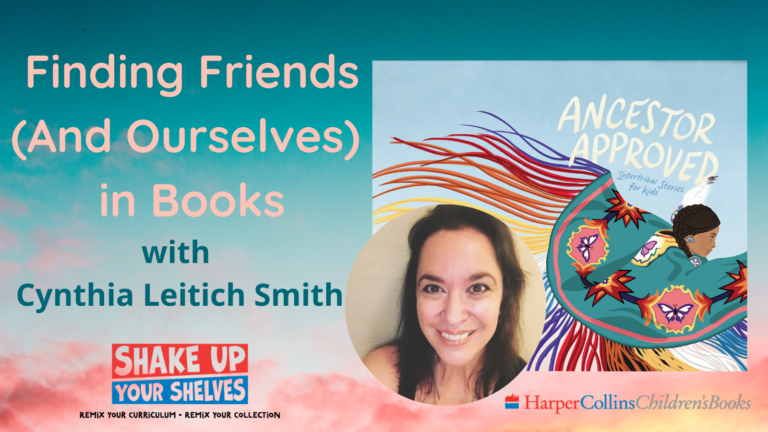Finding Friends (And Ourselves) in Books
By Cynthia Leitich Smith
November is Native American Heritage. As we honor the Indigenous peoples of North America this month, we know the importance of uplifting Native voices every day of the year. Award-winning author Cynthia Leitich Smith is the co-publisher of the new Native imprint, Heartdrum, launching in January 2021. Here she discusses why children of all backgrounds, but particularly children of marginalized backgrounds, to see themselves in literature.
My motto is: Any kid can be a hero that everyone cheers!
In my children’s books, most of the heroes are Native kids of today.
These stories bring together real-world readers and fictional young heroes through deeply felt narratives that reflect daily life and big adventures.
It’s a bonding experience for picture book readers to gather powwow regalia with Jenna, for chapter book readers to take in a Cubs game with Ray, for middle graders to accompany Mel home on the train.
I’m a huge fan of narrative and expository nonfiction. I have a deep appreciation for how it can not only inform but also touch one’s spirit. It beckons to those who read primarily for information while holding up the importance of facts and the true stories that made a difference.
Meanwhile, Native fiction likewise educates young readers, albeit at a slant, and often without them realizing that they are learning per se. Any authentic Native book will shift the knowledge base and mindset of its readers for the better.
Yet what fiction does best is to provide an opportunity for developing interpersonal relationships between real live kids and those who live only on the page. For Native readers, that may mean connecting with a character who embodies aspects of themselves. For non-Native readers, that may mean gaining cross-cultural understanding and empathy.
Or, in other words, my books offer fictional Native young heroes that kids can believe in, care about, and come to regard as friends. That’s vital. It matters so much less whether our students know my ancestors walked the Trail of Tears, if they don’t first and fully appreciate Native people as real human beings. If they don’t experience shared emotions.
I recall a librarian telling me how she’d recommended Rain Is Not My Indian Name to a young reader mourning a sudden loss. Though for weeks the tween had been utterly silent, after finishing the novel, she leaned into the character as a way of expressing her grief. She would make statements like “I understand how Rain felt when she didn’t want to go to the funeral” and “I understand how Rain felt when she didn’t want to put on that dress.” To that kid, Rain was the friend who understood, who could in effect give her the language to take the next step on the healing journey.
That said, for all sorrow that Rain experiences, her life also includes hope, light, and humor. I’m hopeful that had a positive effect, too.
When I receive a bundle of class letters (or an email quoting from a series of them) from kids who’ve read Jingle Dancer or Indian Shoes, the vast majority mention their family’s elders. One child wrote: “I like Jenna. I dance and love Gramma too.”
I can hardly wait to introduce young readers to the cast of Ancestor Approved: Intertribal Stories for Kids. The anthology is centered on a two-day powwow in Michigan and showcases the diversity within Indian Country. Because it was collaboratively created by seventeen Indigenous contributors, the book reflects a vibrant community, highlighted by young Native heroes who occasionally appear in each other’s stories.
Readers will make friends with Jess, who’s Wichita and dances Fancy Shawl, with Luksi who’s Choctaw and travels with a bus full of elders, with Joey who’s Ojibwe and reads the sky along with so many more. Along the way, they’ll also fly like a butterfly, chuckle at old-folks’ jokes, find confidence in their special skills, and so on. They’ll get to know each other better and they’ll get to know themselves better, too.
What’s more, educators have told me that those interpersonal bonds have inspired students to reach for more information about Native people and Nations in much the same way I, as a middle grader, began avidly researching the Salem witch trials after getting to know Kit Tyler from Elizabeth George Speare’s The Witch of Blackbird Pond.
I’m honored that my stories center on Native heroes and welcome young book lovers into their circle. Fictional friends can be every bit as comforting, inspiring, informative and entertaining as real live ones. Sometimes they’re just who we need.


Cynthia Leitich Smith is the author-curator of Heartdrum at HarperCollins and a member of the MFA faculty in Writing for Children and Young Adults at Vermont College of Fine Arts. She is a citizen of the Muscogee Nation and lives in Austin, Texas, with her husband and a long-haired Chihuahua. Her books include Rain Is Not My Indian Name, Jingle Dancer, and Indian Shoes.




